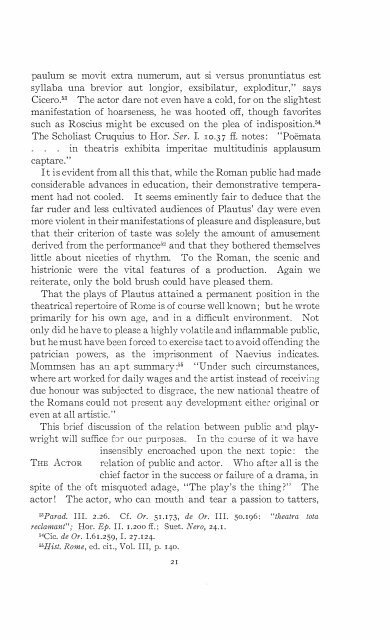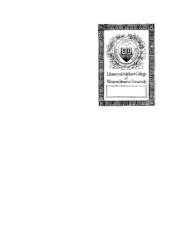Create successful ePaper yourself
Turn your PDF publications into a flip-book with our unique Google optimized e-Paper software.
paulum se movit extra numerum, aut si versus pronuntiatus est<br />
syllaba una brevior aut longior, exsibilatur, exploditur, " says<br />
Cicero.53 The actor dare not even have a cold, for on the slightest<br />
manifestation of hoarseness, he was hooted off, though favorites<br />
such as Roscius might be excused on the plea of indisposition.54<br />
The Scholiast Cruquius to Hor. Ser. 1. 10.3 7 ff. notes : "Poemata<br />
in theatris exhibita imperitae multitudinis applausum<br />
captare."<br />
It is cvident from all this that, whilc the Roman public had made<br />
considerable advances in education, their demonstrative temperament<br />
had not cooled. It seems eminently fair to deduce that the<br />
far ruder and less cultivated audiences of Plautus' day were even<br />
more violent in their manifestations of pleasure and displeasure, but<br />
that their criterion of taste was solely the amount of amusement<br />
derivcd from the performance52 and that they bothered themselves<br />
little about niceties of rhythm. To the Roman, the scenic and<br />
histrionic were the vital features of a production. Again we<br />
reiteratc, only the bold brush could have pleased them.<br />
That the plays of Plautus attai.ned a permanent position in the<br />
theatrical repertoire of Rome is of course well known ; but he wrote<br />
primarily for his own age, and in a difficult environment. Not<br />
only did he have to please a highly volatile and inflammable public,<br />
but he must have been forced to exercise tact to avoid offending the<br />
patrician powers, as the imprisonment of Naevius indicates.<br />
Mommsen has an apt summary :55 "Under such circumstances,<br />
where art worked for daily wages and the artist instead of receivi;lg<br />
due honour was subjected to disgrace, the new national theatre of<br />
the Romans could not present any dev,elopmcnt either original or<br />
even at all artistic."<br />
This brief discussion of the relation between public a:1d pl3;ywright<br />
will suffice for our purposes. In the course of it we have<br />
insensibly encroached upon the next topic : the<br />
<strong>THE</strong> ACTOR relation of public and actor. Who after all is the<br />
chief factor in the success or failure of a drama, in<br />
spite of the oft misquotcd adage, "The play's the thing?" The<br />
actor ! The actor, who can mouth and tear a passion to tatters,<br />
53Parad. III. 2,26. Cf. Or. 5 1.I73, de Or. III. 50.I96:<br />
reclamant"; Hor. Ep. II. 1.200 fl. ; Suet. Nero, 24.1.<br />
54Cic. de Or. 1.61.259, I. 27.I24.<br />
"Hist. Rome, ed. cit., Vol. III, p. I40 .<br />
2I<br />
" theatra tota
















